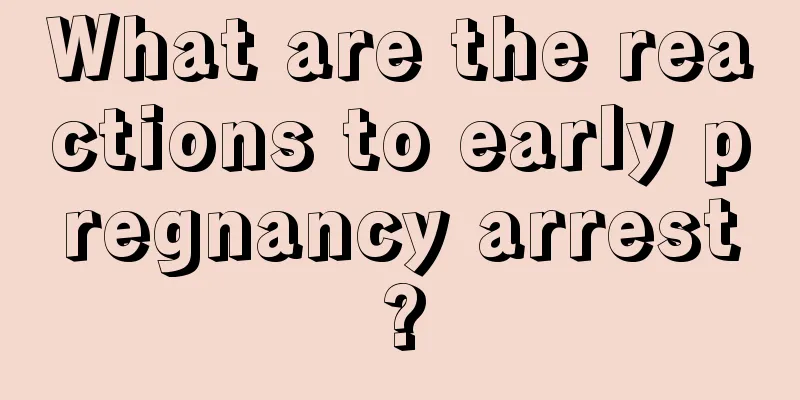What are the reactions to early pregnancy arrest?

|
Fetal arrest in early pregnancy, that is, the fetus stops developing, is a relatively dangerous and regrettable thing. Although the pregnant woman has lost her child, she should not let it affect her mood too much, otherwise it will affect her physical health. If the fetus stops growing in early pregnancy, you need to go to the hospital for certain treatment. Pregnant women can also judge whether the fetus has stopped growing based on some symptoms. Below we will introduce to you in detail several symptoms of fetal arrest in early pregnancy! 1. The number of fetal movements is significantly reduced Generally speaking, the fetus will move in the mother's body at a certain period of time. Relatively speaking, the frequency of fetal movement is relatively stable. Fetal movement is the most objective manifestation of a living organism. Expectant mothers generally understand the frequency and number of their baby's fetal movements. If the fetal movement is significantly reduced or disappears, this may be a sign of fetal growth retardation. 2. Abnormal amniotic fluid Whether the fetus has stopped growing can be determined by whether the amniotic fluid is normal. Amniotic fluid is very important for babies. It is an important substance for babies to survive. If a mother finds that the amount of amniotic fluid is abnormal, whether it is too much or too little, she should pay attention to it and go to the hospital for examination, because it can cause abnormal fetal development or even fetal arrest. 3. Sudden onset of unexplained abdominal pain Sudden onset of unexplained abdominal pain is also a symptom. When a woman is pregnant, changes in her body may cause certain pains. If it is just mild abdominal pain, this is normal pain and mothers don’t need to be nervous. If the abdominal pain suddenly occurs and is very painful, and there are cramps, this must be taken seriously. It is possible that miscarriage or fetal arrest has occurred. 4. Reduced pregnancy reactions You can also judge by the early pregnancy symptoms, such as vomiting, nausea, breast tenderness, etc., because pregnancy reactions usually begin after three or four weeks. Of course, some people will have later symptoms. This varies from person to person, but if the mother obviously feels that the pregnancy reaction is gradually decreasing between 6 and 8 weeks after pregnancy, then mothers should also be alert and go to the hospital for a check-up to see if the fetus is normal or whether the fetus has stopped growing. Of course, some mothers don't show any signs at all, but just experience severe stomach pain, and then suffer miscarriage or fetal arrest. These situations do happen. Therefore, we should observe carefully and do regular inspections. |
<<: Early symptoms of twins in pregnancy
>>: What's the matter with the girl's blood after urinating?
Recommend
Is premenstrual nausea a sign of pregnancy?
Menstruation is something that every girl experie...
Do I need to have my uterus cleaned after a biochemical abortion?
Some women's bodies are prone to unexpected s...
What are the side effects of anti-aging foundation?
Everyone wants to have very good skin. To achieve...
Is it serious if a woman does not have her period for half a month?
Many women have their period once a month, so the...
Pain on the left side of the abdomen during late pregnancy
Women will have various physical problems after b...
How to improve acne on a girl's face
What should girls do if they have acne on their f...
What should I do if I have vaginal bleeding during masturbation?
Vaginal bleeding due to masturbation may very lik...
How to perform cervicitis surgery
Cervicitis is a not uncommon gynecological diseas...
Does abnormal menstruation affect pregnancy?
Some women have irregular menstruation on a regul...
Picture of brown discharge after medical abortion
Generally, there will be no abnormal symptoms aft...
Why is the vaginal discharge yellow?
We all know that whether the secretion of leucorr...
Can I eat Lespedeza during menstruation?
In fact, Lespedeza is a leguminous plant that can...
What is the reason for the pain in the right hip bone?
Pain in the right hip of women is a problem that ...
What is the normal blood sugar level during pregnancy?
We all know that pregnant women are a special gro...









